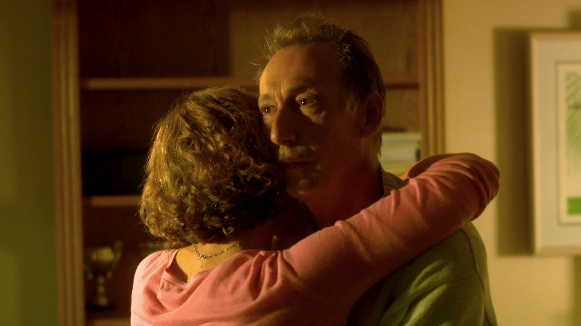The trouble with Black Pond is that it tries a bit too hard to be all things at once. Not that one wishes to fault ambition, but it is a little frustrating to watch a film with so much potential sabotage itself through over-reach.

The Thompsons, one might say, are your average dysfunctional family. Empty nesters Tom and Sophie scarcely communicate, Sophie wandering about their large suburban home disjointedly whilst Tom takes walks in the nearby wood with their three-legged dog, Boy. Daughters Jess and Katie have shifted their squabbles to the big city, where they flat-share with the disturbingly passive Tim. One imagines that there must have been some affection between the four once. But if so, it seems to have been gently washed away by ripples of apathy.
The domestic stasis is shaken when Tom meets Blake by the local pond, whilst on a ramble. Wide-eyed and guileless, Blake nonetheless charms Tom so much so that the latter shakes off a natural English reserve and invites him home for tea (that bit is very English, yes). Sophie, somewhat surprisingly, takes to him too, and before you know it Blake is invited to stay the night because he is scared of the dark.
Oddly enough this all comes across convincingly, unlikely though it may sound. Blake embodies an existential loneliness that Sophie and Tom both recognise in their own individual ways, and from the somewhat slightly surreal set-up is evoked a very personal poignancy.
But then things take a strange turn. The girls are summoned home to deal with an unexpected event and Tim, who drives them back, shakes off his diffidence to quite unexpected effect. Family tensions rise to the boil, but amidst all this Blake remains a strangely uniting presence. Until he drops dead and the family need figure out what to do with him…
It’s not giving too much away to say that Blake’s death precipitates a perplexing chain of events, given that Black Pond is framed by a documentary about what the family choose to do next. The trouble with Black Pond, however, is that it seems unsure whether to take itself seriously or not. Tom, played by Chris Langham (an actor who has known personal difficulties himself: a late career revitalisation was cut short in 2007, after he was convicted on charges of possessing child pornography) is a convincing study of late-middle-age emotional disconnect. The script, in turn deliberately banal and overwrought in turn, engages for long spells.
But the film-makers, Tom Kingsley and Will Sharpe, lose their nerve when it really matters. The crisis that anchors Black Pond is precipitated by a genuinely silly turn between Tim and his psychiatrist, “Dr” Eric Sacks (played most unfunnily by Simon Amstell, a comic and the only other “name” in the film). The framing conceit, likewise, takes the edge off the film and prods it uncertainly into farce.
But for all this, I suppose Black Pond is worth a look. It is in large parts an example of good film-making on a limited budget, and despite its unfortunate whimsy does a good job of conjuring a peculiar brand of existential angst.





